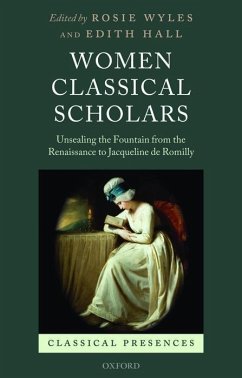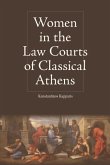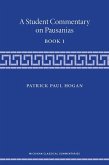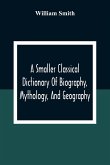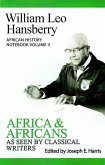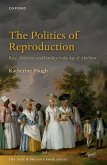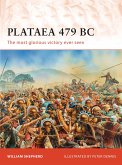Women Classical Scholars
Unsealing the Fountain from the Renaissance to Jacqueline de Romilly
Herausgeber: Wyles, Rosie; Hall, Edith
Women Classical Scholars
Unsealing the Fountain from the Renaissance to Jacqueline de Romilly
Herausgeber: Wyles, Rosie; Hall, Edith
- Broschiertes Buch
- Merkliste
- Auf die Merkliste
- Bewerten Bewerten
- Teilen
- Produkt teilen
- Produkterinnerung
- Produkterinnerung
This volume celebrates the women born between the Renaissance and 1913 who played significant roles in the history of classical scholarship. Synthesizing incisive case-studies with overviews of the evolution of the discipline, it explores their legacy and provides scholars of today with the female intellectual ancestors they did not know they had.
Andere Kunden interessierten sich auch für
![Women in the Law Courts of Classical Athens Women in the Law Courts of Classical Athens]() Konstantinos KapparisWomen in the Law Courts of Classical Athens42,99 €
Konstantinos KapparisWomen in the Law Courts of Classical Athens42,99 €![A Student Commentary on Pausanias Book 1 A Student Commentary on Pausanias Book 1]() Patrick HoganA Student Commentary on Pausanias Book 134,99 €
Patrick HoganA Student Commentary on Pausanias Book 134,99 €![A Smaller Classical Dictionary Of Biography, Mythology, And Geography A Smaller Classical Dictionary Of Biography, Mythology, And Geography]() William SmithA Smaller Classical Dictionary Of Biography, Mythology, And Geography32,99 €
William SmithA Smaller Classical Dictionary Of Biography, Mythology, And Geography32,99 €![Africa and Africans as Seen by Classical Writers Africa and Africans as Seen by Classical Writers]() Africa and Africans as Seen by Classical Writers17,99 €
Africa and Africans as Seen by Classical Writers17,99 €![Hillsboro Hillsboro]() Tara BeeryHillsboro22,99 €
Tara BeeryHillsboro22,99 €![The Politics of Reproduction The Politics of Reproduction]() Katherine PaughThe Politics of Reproduction42,99 €
Katherine PaughThe Politics of Reproduction42,99 €![Plataea 479 BC Plataea 479 BC]() William ShepherdPlataea 479 BC22,99 €
William ShepherdPlataea 479 BC22,99 €-
-
-
This volume celebrates the women born between the Renaissance and 1913 who played significant roles in the history of classical scholarship. Synthesizing incisive case-studies with overviews of the evolution of the discipline, it explores their legacy and provides scholars of today with the female intellectual ancestors they did not know they had.
Hinweis: Dieser Artikel kann nur an eine deutsche Lieferadresse ausgeliefert werden.
Hinweis: Dieser Artikel kann nur an eine deutsche Lieferadresse ausgeliefert werden.
Produktdetails
- Produktdetails
- Verlag: Oxford University Press
- Seitenzahl: 496
- Erscheinungstermin: 12. März 2020
- Englisch
- Abmessung: 213mm x 137mm x 28mm
- Gewicht: 612g
- ISBN-13: 9780198855088
- ISBN-10: 0198855087
- Artikelnr.: 58409583
- Herstellerkennzeichnung
- Libri GmbH
- Europaallee 1
- 36244 Bad Hersfeld
- gpsr@libri.de
- Verlag: Oxford University Press
- Seitenzahl: 496
- Erscheinungstermin: 12. März 2020
- Englisch
- Abmessung: 213mm x 137mm x 28mm
- Gewicht: 612g
- ISBN-13: 9780198855088
- ISBN-10: 0198855087
- Artikelnr.: 58409583
- Herstellerkennzeichnung
- Libri GmbH
- Europaallee 1
- 36244 Bad Hersfeld
- gpsr@libri.de
Rosie Wyles has been a Lecturer in Classical History and Literature at the University of Kent since 2014, having previously held posts at the University of Oxford, the National University of Ireland Maynooth, the University of Nottingham, and King's College London. Her research interests include Greek and Roman performance arts, costume, reception studies within antiquity and beyond, and gender. Her monograph Costume in Greek Tragedy was published in 2011; she has also published chapters on ancient performance and its reception in several collected volumes and her study of Madame Dacier's translations of Aristophanes will be included in the forthcoming Brill's Companion to the Reception of Aristophanes. After holding posts at universities including Oxford, Cambridge, and Durham, Edith Hall took up a chair in Classics at King's College London in 2012. She has published more than twenty books on diverse aspects of ancient Greek and Roman literature and its reception and is a regular broadcaster on BBC Radio and consultant to professional theatre companies, including the Royal Shakespeare Company and the National Theatre. Her most recent book, Introducing the Ancient Greeks, was published by Bodley Head in 2015, in which year she was also awarded the 2015 Erasmus Prize of the European Academy for her contribution to international research. This book represents the editors' second collaboration, having previously co-edited the volume New Directions in Ancient Pantomime for Oxford University Press in 2008. The book was met with critical acclaim on publication and one essay was selected as Best Article for 2008 by the Women's Classical Caucus.
* 1: Edith Hall and Rosie Wyles: Introduction: Approaches to the
Fountain
* 2: Carmel McCallum-Barry: Learned Women of the Renaissance and Early
Modern Period in Italy and England: the Relevance of their
Scholarship
* 3: Sofia Frade: Hic sita Sigea est: satis hoc: Luisa Sigea and the
Role of D. Maria, Infanta of Portugal, in Female Scholarship
* 4: Rosie Wyles: Ménage's Learned Ladies: Anne Dacier (1647-1720) and
Anna Maria van Schurman (1607-1678)
* 5: Jacqueline Fabre-Serries: Anne Dacier (1681), Renée Vivien (1903),
or What Does it Mean for a Woman to Translate Sapphoa
* 6: Edith Hall: Intellectual Pleasure and the Woman Translator in 17th
and 18th-Century England
* 7: Jennifer Wallace: Confined and Exposed: Elizabeth Carter's
Classical Translations
* 8: Liz Gloyn: This Is Not A Chapter About Jane Harrison: Teaching
Classics at Newnham College, 1882-1922
* 9: Michele Valerie Ronnick: Classical Education and the Advancement
of African American Women in the Nineteenth and Twentieth Centuries
* 10: Barbara F. McManus: Grace Harriet Macurdy (1866 1946): Redefining
the Classical Scholar
* 11: Judith P. Hallett: Greek (and Roman) Ways and Thoroughfares: the
Routing of Edith Hamilton's Classical Antiquity
* 12: Roland Mayer: Margaret Alford: a Cambridge Latinist (1868-1951)
* 13: Judith P. Hallett: Eli's Daughters: Female Classics Graduate
Students at Yale, 1892-1941
* 14: Catharine Roth: 'Ada Sara Adler (1878-1946): "The greatest woman
philologist who ever lived"'
* 15: Nina Braginskaya: Olga Freidenberg: a Creative Mind Incarcerated
* 16: Eleanor Irwin: An Unconventional Classicist: the Work and Life of
Kathleen Freeman
* 17: Laetitia Parker: A.M. Dale
* 18: Rowena Fowler: Betty Radice (1912-1985) and the Survival of
Classics
* 19: Barbara K. Gold: Simone Weil: Receiving the Iliad
* 20: Ruth Webb: Jacqueline de Romilly
* Afterword
* Bibliography
Fountain
* 2: Carmel McCallum-Barry: Learned Women of the Renaissance and Early
Modern Period in Italy and England: the Relevance of their
Scholarship
* 3: Sofia Frade: Hic sita Sigea est: satis hoc: Luisa Sigea and the
Role of D. Maria, Infanta of Portugal, in Female Scholarship
* 4: Rosie Wyles: Ménage's Learned Ladies: Anne Dacier (1647-1720) and
Anna Maria van Schurman (1607-1678)
* 5: Jacqueline Fabre-Serries: Anne Dacier (1681), Renée Vivien (1903),
or What Does it Mean for a Woman to Translate Sapphoa
* 6: Edith Hall: Intellectual Pleasure and the Woman Translator in 17th
and 18th-Century England
* 7: Jennifer Wallace: Confined and Exposed: Elizabeth Carter's
Classical Translations
* 8: Liz Gloyn: This Is Not A Chapter About Jane Harrison: Teaching
Classics at Newnham College, 1882-1922
* 9: Michele Valerie Ronnick: Classical Education and the Advancement
of African American Women in the Nineteenth and Twentieth Centuries
* 10: Barbara F. McManus: Grace Harriet Macurdy (1866 1946): Redefining
the Classical Scholar
* 11: Judith P. Hallett: Greek (and Roman) Ways and Thoroughfares: the
Routing of Edith Hamilton's Classical Antiquity
* 12: Roland Mayer: Margaret Alford: a Cambridge Latinist (1868-1951)
* 13: Judith P. Hallett: Eli's Daughters: Female Classics Graduate
Students at Yale, 1892-1941
* 14: Catharine Roth: 'Ada Sara Adler (1878-1946): "The greatest woman
philologist who ever lived"'
* 15: Nina Braginskaya: Olga Freidenberg: a Creative Mind Incarcerated
* 16: Eleanor Irwin: An Unconventional Classicist: the Work and Life of
Kathleen Freeman
* 17: Laetitia Parker: A.M. Dale
* 18: Rowena Fowler: Betty Radice (1912-1985) and the Survival of
Classics
* 19: Barbara K. Gold: Simone Weil: Receiving the Iliad
* 20: Ruth Webb: Jacqueline de Romilly
* Afterword
* Bibliography
* 1: Edith Hall and Rosie Wyles: Introduction: Approaches to the
Fountain
* 2: Carmel McCallum-Barry: Learned Women of the Renaissance and Early
Modern Period in Italy and England: the Relevance of their
Scholarship
* 3: Sofia Frade: Hic sita Sigea est: satis hoc: Luisa Sigea and the
Role of D. Maria, Infanta of Portugal, in Female Scholarship
* 4: Rosie Wyles: Ménage's Learned Ladies: Anne Dacier (1647-1720) and
Anna Maria van Schurman (1607-1678)
* 5: Jacqueline Fabre-Serries: Anne Dacier (1681), Renée Vivien (1903),
or What Does it Mean for a Woman to Translate Sapphoa
* 6: Edith Hall: Intellectual Pleasure and the Woman Translator in 17th
and 18th-Century England
* 7: Jennifer Wallace: Confined and Exposed: Elizabeth Carter's
Classical Translations
* 8: Liz Gloyn: This Is Not A Chapter About Jane Harrison: Teaching
Classics at Newnham College, 1882-1922
* 9: Michele Valerie Ronnick: Classical Education and the Advancement
of African American Women in the Nineteenth and Twentieth Centuries
* 10: Barbara F. McManus: Grace Harriet Macurdy (1866 1946): Redefining
the Classical Scholar
* 11: Judith P. Hallett: Greek (and Roman) Ways and Thoroughfares: the
Routing of Edith Hamilton's Classical Antiquity
* 12: Roland Mayer: Margaret Alford: a Cambridge Latinist (1868-1951)
* 13: Judith P. Hallett: Eli's Daughters: Female Classics Graduate
Students at Yale, 1892-1941
* 14: Catharine Roth: 'Ada Sara Adler (1878-1946): "The greatest woman
philologist who ever lived"'
* 15: Nina Braginskaya: Olga Freidenberg: a Creative Mind Incarcerated
* 16: Eleanor Irwin: An Unconventional Classicist: the Work and Life of
Kathleen Freeman
* 17: Laetitia Parker: A.M. Dale
* 18: Rowena Fowler: Betty Radice (1912-1985) and the Survival of
Classics
* 19: Barbara K. Gold: Simone Weil: Receiving the Iliad
* 20: Ruth Webb: Jacqueline de Romilly
* Afterword
* Bibliography
Fountain
* 2: Carmel McCallum-Barry: Learned Women of the Renaissance and Early
Modern Period in Italy and England: the Relevance of their
Scholarship
* 3: Sofia Frade: Hic sita Sigea est: satis hoc: Luisa Sigea and the
Role of D. Maria, Infanta of Portugal, in Female Scholarship
* 4: Rosie Wyles: Ménage's Learned Ladies: Anne Dacier (1647-1720) and
Anna Maria van Schurman (1607-1678)
* 5: Jacqueline Fabre-Serries: Anne Dacier (1681), Renée Vivien (1903),
or What Does it Mean for a Woman to Translate Sapphoa
* 6: Edith Hall: Intellectual Pleasure and the Woman Translator in 17th
and 18th-Century England
* 7: Jennifer Wallace: Confined and Exposed: Elizabeth Carter's
Classical Translations
* 8: Liz Gloyn: This Is Not A Chapter About Jane Harrison: Teaching
Classics at Newnham College, 1882-1922
* 9: Michele Valerie Ronnick: Classical Education and the Advancement
of African American Women in the Nineteenth and Twentieth Centuries
* 10: Barbara F. McManus: Grace Harriet Macurdy (1866 1946): Redefining
the Classical Scholar
* 11: Judith P. Hallett: Greek (and Roman) Ways and Thoroughfares: the
Routing of Edith Hamilton's Classical Antiquity
* 12: Roland Mayer: Margaret Alford: a Cambridge Latinist (1868-1951)
* 13: Judith P. Hallett: Eli's Daughters: Female Classics Graduate
Students at Yale, 1892-1941
* 14: Catharine Roth: 'Ada Sara Adler (1878-1946): "The greatest woman
philologist who ever lived"'
* 15: Nina Braginskaya: Olga Freidenberg: a Creative Mind Incarcerated
* 16: Eleanor Irwin: An Unconventional Classicist: the Work and Life of
Kathleen Freeman
* 17: Laetitia Parker: A.M. Dale
* 18: Rowena Fowler: Betty Radice (1912-1985) and the Survival of
Classics
* 19: Barbara K. Gold: Simone Weil: Receiving the Iliad
* 20: Ruth Webb: Jacqueline de Romilly
* Afterword
* Bibliography

